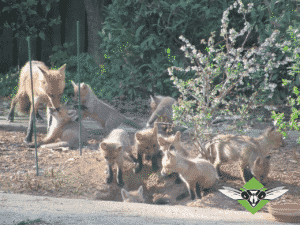Our fox trapping services, like it or not, is the only way to control the local fox population. One of the most challenging animals to trap for Nuisance Wildlife Trappers are the predators. Foxes are smart and cunning. Before you do anything which could be considered as educating the foxes, please call us simply to discuss your situation.
We charge a FLAT RATE TRAPPING FEE for Two (2) weeks of Fox trapping. There is NO setup fee, NO per animal fee, and NO need for an estimate or quote. The trapping fee is all-inclusive: Up to ten (10) trips out every single day (Monday through Friday) to set the traps, check the traps, and remove any foxes trapped. Daily trap checking is important for many reasons: 1) It’s the law 2) Humane to the foxes but equally important it prevents them from associating the traps with being trapped and then they start to avoid them. 3) It enables us to make the most out of your trapping dollars by our Professional Wildlife Technicians having the opportunity to reposition any traps that are not productive and refreshing the bait if necessary. Because of the sensitive nature of trapping & human curiosity – we are very particular of which fox trapping jobs we will accept. The circumstances have to be right and we will never trap on property that is not private property & owned by our client.

WHAT TO EXPECT WHEN WE PROVIDE FOX TRAPPING SERVICES
– We have to inspect the property to determine the best trap to use and the location of the trap(s). With that said, there are several types of traps we can use. – We use leghold /foot restraint traps that are highly effective and humane. – In order to reduce stress to the animal, our trap checks are prioritized for the morning time. Less opportunity for the trapped animal to draw attention or cause problems. – We adhere to the laws of the State of Georgia for releasing Fox that we are successful in trapping.
Some of the most common cities that we provide fox trapping services for are: [cities count=”20″ major_cities=“true“]
FOX SIGHTINGS
It is a common misconception that any foxes seen during the day are sick or rabid. Foxes are extremely curious & adaptive and if their food supply is getting low or they have babies to feed, then they are forced to hunt whenever it is productive. An ounce of Prevention:
- If sighted, make noises to scare it off. Don’t just observe them and quietly walk away. Throw stuff at them and make them maintain their level of fear of humans.
- Advise anyone with small-breed dogs to walk them on a leash at night. Even in a backyard, a fox can scale a 6 ft high privacy fence with ease.
- Keep domestic cats in at night. Don’t let them roam the neighborhood. Predators & Cars rival for the #1 spot for the reason “missing cat” signs get posted in neighborhoods.
- If you have an overabundance of any rodent. It will draw in a fox like a magnet. Mother nature always brings balance… Coyotes & foxes punch the numbers down.
- Don’t leave animal food outside.
- Feral cat feeding… not only does it throw off (decimate) the bird & rodent population. It also attracts coyotes & foxes.

